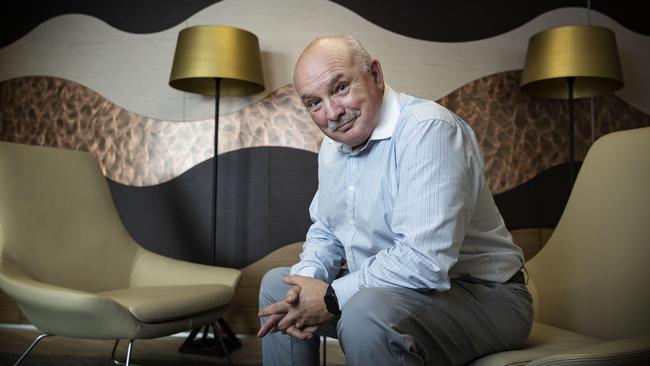Energy boss Peter Botten answers call
When Oil Search boss Peter Botten’s mobile started ringing shortly after 4am, he sensed trouble.

When Oil Search boss Peter Botten’s mobile started ringing shortly after 4am, he sensed trouble.
At the other end of the line via a crackly satellite phone, Botten heard how Papua New Guinea had just been hit by a massive magnitude 7.5 earthquake.
The veteran energy executive was already en route to Cairns airport for a scheduled flight to Port Moresby. On his arrival on the day of the disaster — February 26, 2018 — the devastation was stark and confronting.
Botten put an emergency plan in place to evacuate about 1000 workers from some of the country’s remote regions where it operates gas gathering and production facilities.
While no Oil Search staff were injured, the nation had been severely hit with more than 160 casualties and scores injured.
With a meaningful response from aid agencies days away, Botten knew Oil Search itself could play a pivotal part in delivering aid and using its deep community connections to deploy funds and materials to the areas that needed it most.
With roads out of action for weeks, Oil Search became the de facto logistics provider using its fleet of helicopters to overcome a debilitated infrastructure network and help over 120,000 people with emergency supplies in the Hela and Southern Highlands and part of the Gulf and Western Provinces.
Oil Search could receive aid supplies, respond to communities with medical support and deliver to remotely impacted areas all within the same day.
“As one landowner leader said to me I will remember who came in our hour of need to help us, but equally I’ll remember who didn’t come,” Botten tells The Weekend Australian. “They knew they could rely on us.”
Botten’s award today as a Companion of the Order of Australia encompasses his near three decades of service to Australia-PNG relations.
His work helping co-ordinate earthquake relief underlines the depth and understanding of the oil and gas executive’s relationships in remote PNG communities.
Botten can trace his in-country connections back until 1992 when he first joined the company and over the years since he can point to a host of social initiatives in the management of HIV and AIDS, family and sexual violence, gender equality and literacy milestones.
The British-raised executive is the first to admit, however, that the job isn’t done.
PNG still ranks as one of the most underdeveloped nations on a range of social indicators.
The heralded PNG LNG export project, which started operations in 2014 and is partly owned by Oil Search, has benefited parts of the country although the welfare of many locals has barely budged.
Expectations are high that an imminent expansion of that facility and the new Papua LNG project will deliver better returns to PNG locals and help boost local industry beyond just the gas export developments.
In the meantime, Botten can point to Oil Search’s role helping to fund and operate the Hela Provincial Hospital, which provides healthcare access for 500,000 locals.
As he prepares to pass the baton to his successor in the next year, the company will look at initiatives to ensure targeted progress — particularly for the nation’s huge youth population — is made at a PNG community level.
“Developing oil and gas is one thing, but really fostering social responsibility and improving the economy and the cohesion of the community is everything to me,” he says. “We’re proud to be making a difference.”




To join the conversation, please log in. Don't have an account? Register
Join the conversation, you are commenting as Logout